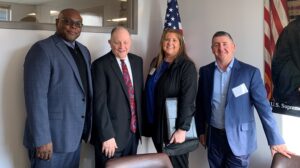Note: The following e-newsletter was sent to Sen. Padden’s subscribers March 16, 2023. To subscribe to Sen. Padden’s newsletter, click here.
The 2023 legislative session is now in its 10th week, with five weeks to go. April 23 is the scheduled last day.
As the Legislature approaches the home stretch of this year’s session, there is still plenty of work ahead. At the top of the to-do list are passing new two-year state operating, capital and transportation budgets.
Democrat budget writers are expected to unveil their operating budget proposal late next week, just days after the next state revenue forecast is released. House Democrat budget writers likely will release their spending plan a few days later after the Senate budget comes out.
One big question leading up to next week’s operating budget rollout is whether the Democrats will propose new or higher taxes. The most recent state revenue forecast, released last November, revealed that state revenues are expected to increase by $545 million for the 2021-23 biennium (which ends June 30) and $684 million for the 2023-25 budget cycle. In terms of total dollars, it showed the state with $60.779 billion in revenue for the current biennium and $62.966 billion for the 2023-25 biennium. There is no need for any new taxes.
A recent example is the capital-gains/state income-tax proposal that was passed by majority Democrats and signed by Governor Inslee in 2021. (That tax was ruled unconstitutional in March 2022. An appeal of the ruling is before the state Supreme Court, which heard arguments in the case in late January. There is no word on when the court will issue its ruling.)
Although our state has plenty of money in its coffers, that apparently is not enough to satisfy some legislators. A new and notable example is Senate Bill 5486, which was introduced by 36th District Sen. Noel Frame, a Seattle Democrat. SB 5486 would establish what some call a “wealth tax” – a 1 percent tax on “financial intangible assets” in excess of $250 million.
Republicans oppose this bill because the sponsors clearly want to create another way to take away money from people, even though the state already has enough money. Instead of continually trying to target those in a particular income bracket, the bill’s sponsors should focus on getting the most out of existing tax dollars and making state government more efficient.
The Democrats’ wealth-tax bill received a public hearing last week in the Senate Ways and Means Committee. Because it is a bill that is considered “necessary to implement the budget,” SB 5486 has been exempted from any of the deadlines for Senate bills to be passed.
Many people testified either in favor of or in opposition of SB 5486. The testimony of two people who testified against the bill, anti-tax activist Tim Eyman and Association of Washington Business official Emily Shay, made good points on why the bill should not be approved by the Legislature. You can watch their testimony here.
Other Republicans and I will continue to fight this unnecessary and harmful proposal and try to prevent it from being approved.
This newsletter covers several other issues and events happening in Olympia in this past week.
If you have questions about how to participate in state government this year or thoughts to share on anything in this e-newsletter, please give me a call or send me an email.
Thank you, as always, for the honor of serving as your state senator!
Best Regards,
Senator Mike Padden
Bill targeting catalytic-converter thefts receives Senate hearing
The fastest-growing crime problem in Washington in the past couple of years is catalytic-converter thefts. Catalytic converters use elements like platinum to make vehicle exhaust less harmful, and this crime has skyrocketed over the past two years as precious-metal prices have increased. Thieves can crawl under a car and saw a catalytic converter out of an exhaust system in minutes – or less – which leaves the vehicle owner in a real bind.
About 4,000 catalytic-converter thefts were reported in Washington in 2021, according to the National Insurance Crime Bureau, ranking the state third in the U.S. Preliminary figures for 2022 put our state on pace to match or surpass that figure.
On Tuesday, the Senate Law and Justice Committee held a public hearing on Senate Bill 5740, which aims to deter catalytic-converter thefts. One of my colleagues, 19th District Sen. Jeff Wilson of Longview, is the bill’s prime sponsor, and I’m a co-sponsor.
SB 5740 would target the crime rings behind our state’s fastest-growing crime by going after those who purchase stolen catalytic converters in order to recycle them for their valuable precious-metal content.
Under this proposal, those who purchase catalytic converters removed from vehicles must:
- Obtain a valid license as a scrap dealer or an auto wrecker.
- Post it on display at their place of business.
- Keep meticulous records of each transaction, including a photocopy of the seller’s driver license.
- Promptly report any transaction to police that appears to be suspicious.
Anyone purchasing five or more catalytic converters without a license would be guilty of a Class B felony, trafficking in catalytic converters, which is punishable by up to seven years in prison. Purchase of four or fewer would be a Class C felony.
SB 5740 is exempt from last week’s floor cutoff for Senate bills to be passed by the Senate because it is considered necessary to implement the operating budget. There still is work to be done on this bill.
Padden bills update
Sen. Padden testifying on one of his bills earlier this session.
Two of the bills that I introduced earlier this session have seen action in House committees this week.
On Tuesday I testified before the House Innovation, Community and Economic Development, and Veterans Committee in favor of my Senate Bill 5096, which would aid businesses looking to adopt an employee stock ownership plan (ESOP) corporate structure. This bill promotes employee ownership, which is good, not only for our employees but for society. Studies have shown that employee-owners are happier, they stay in their job longer and they retire in a much better financial position. Also, employee-owned companies are more likely to stay locally. Additionally, this bill would help those businesses looking to adopt an ESOP. Bryan Richter of Schweitzer Engineering testified in support of the bill. The committee has scheduled a vote on SB 5096 tomorrow morning.
This morning the House Community Safety, Justice and Reentry Committee unanimously approved Senate Bill 5033, a bipartisan measure that would impose longer sentences on sexually abusive jail and prison guards. The bill would reclassify the crime of first-degree custodial sexual misconduct as a Class B felony, allowing a prison term of 10 years instead of the current five-year maximum.
Officers who work in our state’s correctional facilities are part of the law-enforcement community. Like all the other officers who serve the public, corrections officers must be held to a high standard, especially considering the unique level of authority they have over people in custody. SB 5033 would increase the punishment for corrections officers who sexually assault or abuse inmates in the course of their jobs.
The bill was inspired by a KING-TV investigation about a Clallam County jail guard, John Gray, who was convicted in 2021 of two felony and two misdemeanor counts of custodial sexual misconduct and served 13 months of his 20-month sentence.
Changes with Senate office staff
An e-newsletter in January shared a photo of my Senate office staff for this year’s session. The office staff recently underwent some changes. Scott Staley, my legislative assistant earlier this session, recently left this position for personal reasons, and we will miss him very much. Irina Dolbinina, who began the year as my session aide, is now my legislative assistant for the remainder of the session. Ethan Mettlin, who served as my session intern, will be the session aide through the end of April.
Expect higher fuel prices following state’s first carbon auction
When the Democrat majorities in the Legislature passed the so-called “Climate Commitment Act” two years ago, supporters of the law contended that the “cap-and-trade” program it created would not be very costly to fuel companies or consumers. Now it looks like they will be wrong.
Earlier this month, the state Department of Ecology announced the results from the state’s first carbon-allowance auction, which was mandated by the CCA. The recent auction is the first of a series of quarterly auctions under the law. The estimate in 2021 was that carbon “allowances” under the cap-and-trade program would cost $22.78 per metric ton of carbon. But the recent auction showed these allowances costing $48.50, more than double the cost some had predicted.
The $48.50 allowance would translate to 39 cents per gallon for gasoline and 47 cents a gallon for diesel. Although the advocates for the Climate Commitment Act might argue that oil companies would absorb these extra costs, that is not realistic. It’s much more likely that any additional costs somehow will be passed on to consumers, who already have faced high fuel prices over the past year or two.
Photos with visitors this week
On Wednesday, I had meetings with several people in my office to discuss various issues before the Legislature this session. The top photo shows me with officials with the Washington Auto Dealers Association (from left to right are Anthony Brock, Kristin Goffand Mario Wierzchowski). The bottom photo shows me with Sarah Davenport-Smith from Human Life of Washington.
Contact us!
If you have a question or concern about state government, please do not hesitate to contact our office. During the session we are conducting business from our Senate office in Olympia. We are here to serve you!
Phone: (360) 786-7606
Olympia Office: 215 Legislative Modular Building, Olympia, WA 98504-0404
Email address: Mike.Padden@leg.wa.gov
PLEASE NOTE: Any email or documents you provide to this office may be subject to disclosure under RCW 42.56. If you would prefer to communicate by phone, please contact Sen. Padden’s Olympia office at (360) 786-7606.
To request public records from Sen. Padden, please contact Randi Stratton, the designated public records officer for the Secretary of the Senate and Senate members.
















